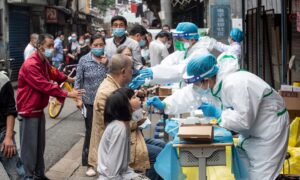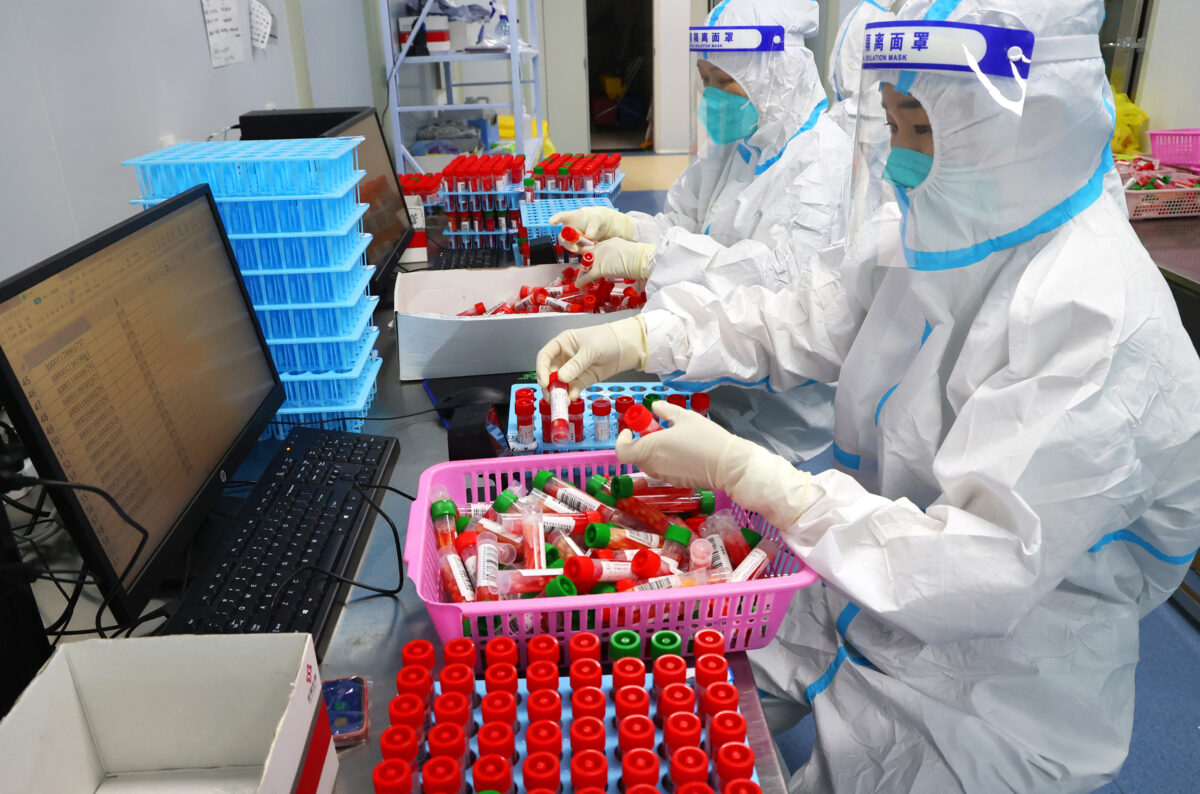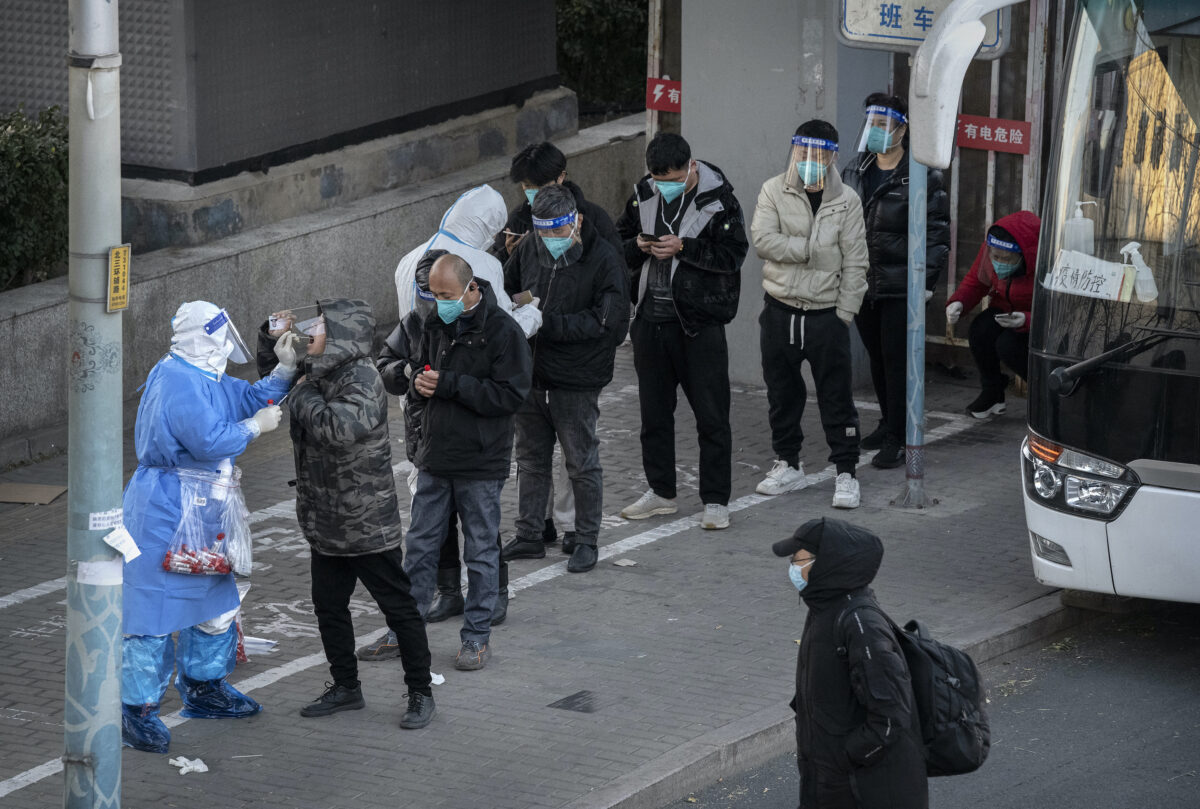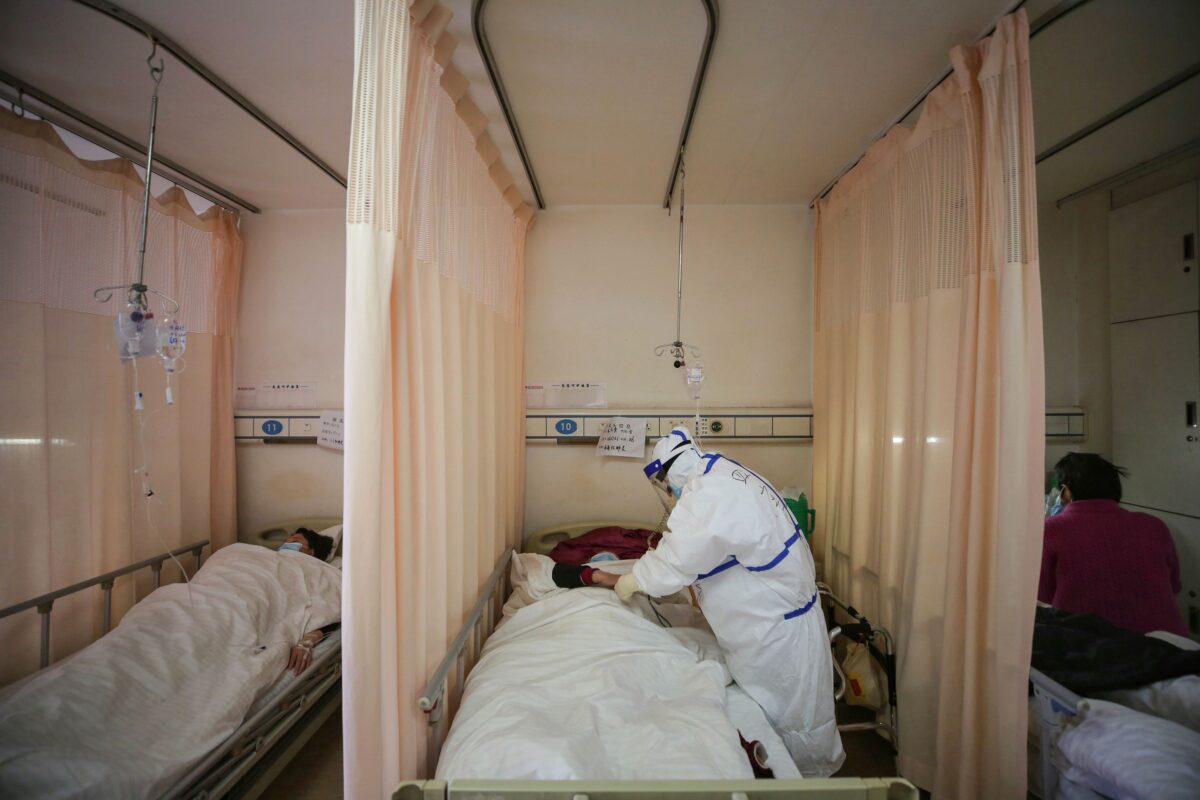China’s Zero-COVID Policy a Shield for Windfall Revenues for Local Governments, Gene Companies
News AnalysisTwo crucial pillars of the Chinese Communist Party’s (CCP) zero-COVID policy, intensive testing and lockdowns, have formed a huge chain of interests that have depleted the state treasury and sacrificed people’s livelihoods, according to China expert Henghe. Since the beginning of December, China has lifted its zero-COVID restrictions and a new wave of the epidemic has broken out across the country. In Beijing, Hebei, Henan, Liaoning, Guangdong, and many other provinces and cities, the funeral industry is overloaded. Beijing Tongzhou Funeral Parlor issued a notice on Dec. 11 that it was working overtime, reported chinesecitizen.org on Dec. 22. China’s anti-virus measures have not been effective in saving people’s lives, and the zero-COVID policy is likely an umbrella for CCP interest groups that have been scrambling to reap lucrative profits from mass mandatory testing and lockdown curbs, according to Henghe. Laboratory technicians work at a Covid-19 testing facility in Lianyungang in China’s eastern Jiangsu province on August 23, 2022. (AFP via Getty Images) Nucleus Lab Reports False COVID Test Results Since the COVID-19 outbreak in China, nucleic acid testing has become a hot business, inevitably accompanied by problems such as falsified testing data, data errors, and lost samples. On Nov. 25, the Health Committee of Lanzhou city, Gansu Province, issued a notice stating that Lanzhou Nucleus Huaxi Laboratory wrongly recorded the information of individual nucleic acid testing abnormalities into the package of negative personnel and uploaded it to the system, making health codes show negative. The notice said that the lab will be heavily penalized. Data corporation Tianyancha shows that Lanzhou Nucleus Huaxi Laboratory, wholly owned by Shenzhen Nucleus Gene Technology, was just established on Aug. 8 and quickly entered the government-approved list of third-party nucleic acid testing organizations. Zhang Shanshan is the supervisor of the lab, who also serves as an executive in other 38 nucleic acid testing companies. Shenzhen Nucleus Gene Technology was founded in April 2012 and has 79 externally controlled companies. These “Nucleus Huaxi” medical testing laboratories are widely distributed throughout China. Lanzhou Nucleus Huaxi Laboratory is not alone. In January 2021, Jinan Huaxi had been reported for “lying about the results of nucleic acid testing”; From May to August of this year, Nucleus Huaxi in Hangzhou, Shenzhen, and Changsha received warnings or was fined by the local health commission for “irregular sterilization procedures,” “using non-health technicians to perform medical work,” or other non-compliances, according to Chinese portal site Sina. Government-Supported Third-Party Testing Affiliates Despite repeated problems with those nucleic acid testing facilities, their parent Shenzhen Nucleus Gene has never stopped expanding its business in the market and 2022 reaches its fastest year of growth. As of November 2022, Shenzhen Nucleus Gene has opened 16 medical testing laboratories. November registered Xining company; October opened 8 in Zhuhai, Quanzhou, Xiamen, Yinchuan, Taiyuan, Qingdao, Dalian, and Haikou; September registered Beijing and Guizhou company, August registered Lanzhou company; May registered Inner Mongolia company, according to business registration information. It is puzzling that a round of virus outbreaks would occur shortly after such a testing company is registered, followed by mass nucleic acid testing in the area where the company is located. For example, Hefei Nucleon Huaxi was established in September, and a COVID-19 outbreak occurred in Hefei in October; Beijing Nucleon Huaxi was established on Sept. 29, and the number of outbreaks in Beijing increased gradually since October, with a sharp increase in early November; Dalian Nucleon Huaxi was registered on Oct.14, and as of Nov. 24, 67 new cases were added daily in Dalian; Taiyuan Nucleon Huaxi was established on Oct. 21, and an outbreak began in Taiyuan on Nov. 19; Xining Nucleon Huaxi was established on Nov. 12, and the number of confirmed cases in Xining increased rapidly soon after. Is it a coincidence that a local outbreak closely follows the registration of the nucleic acid testing facility? Industry insiders speculated that Shenzhen Nucleus Gene may be deeply tied to the interests of local authorities, as the nucleic acid testing business is not as simple as just registering a company, but requires third-party testing permission from the local government, and finally, so-called bidding procedures and announcements. With the aid of official support, Shenzhen Nucleus Gene uses a franchise model to enable its dozens of testing facilities to sprawl over China. According to Chinese medial media OFweek, as of March 9, 2020, Shenzhen Nucleus Gene had 450 million yuan ($64 million) worth of nucleic acid testing revenue, while on Nov. 25 of this year, the gene company said it has completed 700

News Analysis
Two crucial pillars of the Chinese Communist Party’s (CCP) zero-COVID policy, intensive testing and lockdowns, have formed a huge chain of interests that have depleted the state treasury and sacrificed people’s livelihoods, according to China expert Henghe.
Since the beginning of December, China has lifted its zero-COVID restrictions and a new wave of the epidemic has broken out across the country. In Beijing, Hebei, Henan, Liaoning, Guangdong, and many other provinces and cities, the funeral industry is overloaded. Beijing Tongzhou Funeral Parlor issued a notice on Dec. 11 that it was working overtime, reported chinesecitizen.org on Dec. 22.
China’s anti-virus measures have not been effective in saving people’s lives, and the zero-COVID policy is likely an umbrella for CCP interest groups that have been scrambling to reap lucrative profits from mass mandatory testing and lockdown curbs, according to Henghe.

Nucleus Lab Reports False COVID Test Results
Since the COVID-19 outbreak in China, nucleic acid testing has become a hot business, inevitably accompanied by problems such as falsified testing data, data errors, and lost samples.
On Nov. 25, the Health Committee of Lanzhou city, Gansu Province, issued a notice stating that Lanzhou Nucleus Huaxi Laboratory wrongly recorded the information of individual nucleic acid testing abnormalities into the package of negative personnel and uploaded it to the system, making health codes show negative. The notice said that the lab will be heavily penalized.
Data corporation Tianyancha shows that Lanzhou Nucleus Huaxi Laboratory, wholly owned by Shenzhen Nucleus Gene Technology, was just established on Aug. 8 and quickly entered the government-approved list of third-party nucleic acid testing organizations.
Zhang Shanshan is the supervisor of the lab, who also serves as an executive in other 38 nucleic acid testing companies.
Shenzhen Nucleus Gene Technology was founded in April 2012 and has 79 externally controlled companies. These “Nucleus Huaxi” medical testing laboratories are widely distributed throughout China.
Lanzhou Nucleus Huaxi Laboratory is not alone. In January 2021, Jinan Huaxi had been reported for “lying about the results of nucleic acid testing”; From May to August of this year, Nucleus Huaxi in Hangzhou, Shenzhen, and Changsha received warnings or was fined by the local health commission for “irregular sterilization procedures,” “using non-health technicians to perform medical work,” or other non-compliances, according to Chinese portal site Sina.
Government-Supported Third-Party Testing Affiliates
Despite repeated problems with those nucleic acid testing facilities, their parent Shenzhen Nucleus Gene has never stopped expanding its business in the market and 2022 reaches its fastest year of growth.
As of November 2022, Shenzhen Nucleus Gene has opened 16 medical testing laboratories. November registered Xining company; October opened 8 in Zhuhai, Quanzhou, Xiamen, Yinchuan, Taiyuan, Qingdao, Dalian, and Haikou; September registered Beijing and Guizhou company, August registered Lanzhou company; May registered Inner Mongolia company, according to business registration information.
It is puzzling that a round of virus outbreaks would occur shortly after such a testing company is registered, followed by mass nucleic acid testing in the area where the company is located.
For example, Hefei Nucleon Huaxi was established in September, and a COVID-19 outbreak occurred in Hefei in October; Beijing Nucleon Huaxi was established on Sept. 29, and the number of outbreaks in Beijing increased gradually since October, with a sharp increase in early November; Dalian Nucleon Huaxi was registered on Oct.14, and as of Nov. 24, 67 new cases were added daily in Dalian; Taiyuan Nucleon Huaxi was established on Oct. 21, and an outbreak began in Taiyuan on Nov. 19; Xining Nucleon Huaxi was established on Nov. 12, and the number of confirmed cases in Xining increased rapidly soon after.
Is it a coincidence that a local outbreak closely follows the registration of the nucleic acid testing facility?
Industry insiders speculated that Shenzhen Nucleus Gene may be deeply tied to the interests of local authorities, as the nucleic acid testing business is not as simple as just registering a company, but requires third-party testing permission from the local government, and finally, so-called bidding procedures and announcements.
With the aid of official support, Shenzhen Nucleus Gene uses a franchise model to enable its dozens of testing facilities to sprawl over China.
According to Chinese medial media OFweek, as of March 9, 2020, Shenzhen Nucleus Gene had 450 million yuan ($64 million) worth of nucleic acid testing revenue, while on Nov. 25 of this year, the gene company said it has completed 700 million nucleic acid tests and is preparing to launch an IPO.
Based on the current minimum price, 5 yuan ($0.72) per person for pooled sample testing, if Shenzhen Nucleus Gene does all pooled sample testing, the revenue generated by 700 million visits could reach 3.5 billion yuan ($504 million), a record-breaking lucrative profit in the medical testing industry.

Huge Profit Chain Behind Nucleic Acid Testing Industry
“Mass nucleic acid testing is linked with a huge chain of interests,” Lai Jianping, a Master of International Law at China University, told The Epoch Times in May.
According to data by the National Health Commission, the number of nucleic acid testing laboratories soared more than tenfold, or 13,100 in April 2022 from 2,081 in March 2020 amid the zero-COVID policy, with a testing capacity of 51.65 million tubes per day. The new polymerase chain reaction testing laboratories climbed to roughly 11,000, more than six times that in March 2020.
The three-year draconian zero-COVID policy has placed almost all the Chinese industries in the doldrums, except for the nucleic acid testing industry, which has become so profitable that many testing companies seek to go public.
The first three quarters of 2022 saw 109 listed nucleic acid testing companies, with total revenue of about 363 billion yuan (about $50 billion), an increase of about 22 percent over the same period last year; net profits totaled about 85 billion yuan (about $11 billion), a 34 percent rise over the same period last year, according to Chinese portal site Sina.
Special Government Bonds for Building Mobile Cabin Hospitals
On Nov. 26, Shandong provincial news media reported a special bond issuance program for building a mobile cabin hospital in Haiyang city, Shandong Province, in March.
The project defined “the next five years as a period of epidemic.” A large sum of 120 million yuan ($16 million) will be invested in the entire cabin isolation project, with 24 million yuan ($3 million) to be raised by the local government and the remaining 96 million yuan ($13 million) to be raised in public through the issuance of special government bonds.
The cabin is estimated to quarantine an average of 100 people per day. The total revenue of the project will be 240 million yuan ($34 million) and the investment ratio will be more than two times, the report said.
A special bond is a project that a local government plans to build but lacks the funds to do so, so it uses the government’s credit as an endorsement to finance the project. In addition, special bonds are included in the government fund budget and are not included in the budget deficit.
Not only Haiyang city, Shandong Province’s other cities also issued special bonds to build mobile cabin hospitals for isolation use during the COVID-19 epidemic.
For example, Taian municipal authority approved on March 26 to launch 229 million yuan ($31 million) of government bonds, about 80 percent of the total investment, in support of a 40-acre, four-story mobile cabin hospital; Yantai city government will issue 100 million yuan (approximately $13 million) worth of government bonds, accounting for 79.6 percent of the total funds, to build a 1,734-room mobile hospital; Longkou city intended to finance the construction of a 120,000 square meter (129,1669 square foot) mobile isolation hospital with 234 million yuan (approximately $32 million) in local government bonds, making up 78 percent of the total funds.
According to a Nov. 29 report of Sina, Shandong Province has issued more than 15 billion yuan ($2.08 billion) in special bonds for the construction of permanent mobile cabin hospitals and isolation sites, with nearly 90 percent of the projects completing construction within a year.
A common feature of these special bond projects is that the project sponsors defined the next five years as an epidemic period.
Han Bing, a law professor at Renmin University denounced the situation on Weibo, a Twitter-like Chinese social media, saying: “Is it crazy? How can [one] count on an epidemic to end when making mobile cabin hospitals becomes an industry?”

Nationwide Quarantine Sites
Large-scale projects for mobile cabin hospitals and isolation sites were in full swing across the country in May when Ma Xiaowei, director of the National Health Commission, published an op-ed in the party magazine “Qiushi,” claiming to speed up preparations for permanent mobile cabin hospitals and centralized isolation sites.
Shangqiu, central Henan Province, has become the first city in China to publicly respond to the construction of a permanent cabin hospital, with the first phase costing 135 million yuan (about $18.67 million) to build 1,000 new isolation sites.
On May 7, a 4,000-bed mobile hospital was built in the Zhengzhou Airport region. On July 6, the Hohhot Health Care Commission issued a project announcement for the construction of a 55,861 square meter (601,282 square foot) mobile hospital and related facilities with an investment of 80 million yuan (approximately $11 million).
On Oct. 20, Lanzhou started the construction of two cabin hospitals at the same time, providing a total of more than 4,000 isolation beds and a total construction area of 28,000 square meters (301,389 square feet).
Shanghai municipal government and state-owned builder China Communications Construction Corp. signed a 1.38-billion-yuan ($191 million) contract to build a 3,250-bed cabin hospital on Fuxing island near Huangpu River on Oct. 19, Reuters reported.
On Nov. 23, a mobile cabin hospital was officially put into operation in Beijing.
Chongqing has built the largest hospital in the region with a total of 26,313 beds, according to China News on Nov. 22.
An official notice circulating online showed that Guangdong Province’s Huilai county, Shenquan township sent an emergency notice saying that in order to implement the requirement that “each county must build a mobile cabin hospital” All graves within the area of Shennong village were required to be relocated, requiring grave owners or their relatives to complete the relocation of graves within 2 days, otherwise the graves will be treated as no-owners and all consequences and responsibilities will be borne by themselves.
There are 122 districts and counties in Guangdong, which means that 122 cabin hospitals are to be built.
Mobile hospital construction is a huge, not a one-time industry investment, and will produce operating and management costs.
Wuhan resident Zhang Hai told the Chinese edition of The Epoch Times on Nov. 23 that he suffered a lot from the mandatory testing and harsh lockdown measures, saying that “since the authorities spent the money to build those quarantine sites, they must send people in. Otherwise, how can they explain to the top where the money goes? That’s why some paid to get people into the cabin hospital.”
Large-scale nucleic acid testing and cabin isolation has become the fiscal revenue of the local government, “in this case, how can the CCP authorities make it easy to end an epidemic that can reap benefits for them?” Zhang questioned.
“The people who have the power to decide to build the quarantine sites, including the constructors themselves, all have a stake in it. In the three years of the epidemic, those doing nucleic acid testing, selling masks, and selling protective clothing have all made fortunes.”
The investment in building mobile hospitals is enormous, and those involved will be thinking about making more money or at least recouping their costs, Zhang added.












